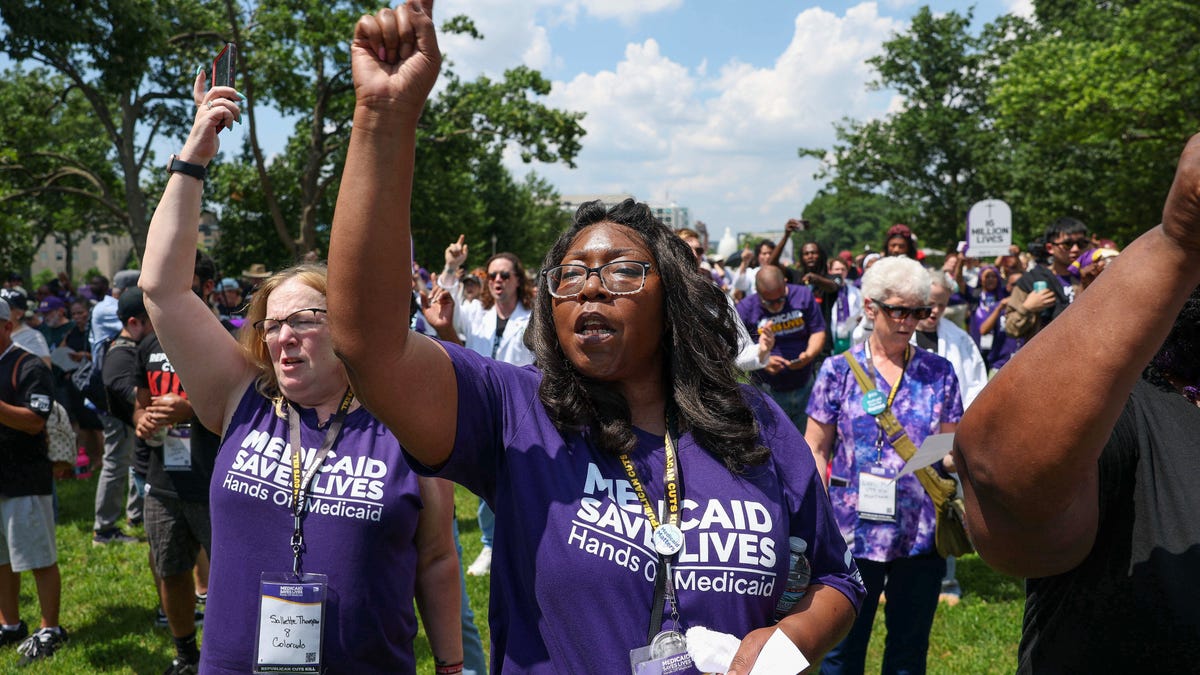
The winners and losers in the ‘big beautiful bill’
These are the potential winners and losers from the tax bill, which President Donald Trump has dubbed the ‘big beautiful bill’.
The Senate cleared President Donald Trump’s domestic spending and tax cut bill that will enact steep cuts to the nation’s safety-net health insurance program for low income families.
In addition to delivering tax cuts and increasing immigration enforcement, what Trump has called the “Big Beautiful Bill” would cut nearly $1 trillion from Medicaid, the state-federal health program for low-income families and the disabled. The bill is projected to eliminate insurance coverage for 11.8 million people over the next decade, according to the nonpartisan Congressional Budget Office.
Another 5 million could lose coverage if Congress doesn’t extend the COVID-19 pandemic-era tax credits that have made Affordable Care Act plans more affordable for consumers.
The legislation amounts to “the biggest rollback in health care coverage in the history of the United States,” said Joan Alker, a research professor and executive director and co-founder of Georgetown University’s Center for Children and Families.
Vice President JD Vance, who cast the tiebreaking vote July 1 to pass the Senate bill 51-50, said in social media posts the Medicaid cuts are “immaterial” compared to savings the bill will fund through bolstered immigration enforcement. The House is scheduled to consider the legislation on July 2 in advance of Trump’s self-imposed July 4th deadline for his signature domestic policy legislation.
How will the legislation cut Medicaid?
The legislation would require states to double eligibility checks to twice a year. And states, which administer Medicaid, would have to set up systems to verify a person’s employment or exemption status.
The legislation requires “able-bodied” Medicaid recipients to work 80 hours a month or qualify for an exemption, such as being a student, caregiver or having a disability. The original House version limited the work requirement to low-income adults without children, but the Senate version added the work requirement to parents of children older than 13.
The legislation defines “able-bodied” people as those not medically certified as physically or mentally unfit for employment. The legislation also would strip coverage from undocumented immigrants who get Medicaid through state-funded programs.
Health policy experts say more frequent eligibility checks and red tape will add administrative costs and cut off people who qualify but fall through the cracks because of administrative miscues.
What do hospitals and doctors think of bill?
Medicaid insures 83 million low-income children and adults, according to KFF, a health policy nonprofit. That represents more than 1 in 5 Americans.
Health policy experts have warned the cuts could harm rural hospitals and doctors who serve a higher percentage of people enrolled in Medicaid. The Senate bill added a $50 billion rural health care fund, double the amount that an earlier version of the legislation proposed.
Still, hospitals are “deeply disappointed” the bill cleared the Senate, said Rick Pollack, president and CEO of the American Hospital Association, a trade group.
Pollack said the $1 trillion in Medicaid cuts would cause “irreparable harm to our health care system,” and reduce access to care for all Americans.
Hospitals are required to diagnose and stabilize anyone who visits an emergency room. Eliminating coverage of nearly 12 million Americans will “drive up uncompensated care for hospitals and health systems,” Pollack said.
Pollack said hospitals might be forced to cut services and staff, and patients could face longer wait times in emergency rooms. Some rural hospitals and facilities in underserved communities could close, Pollack said.
Dr. Richard Besser, president and CEO of the Robert Wood Johnson Foundation, said the cuts to Medicaid and a federal food assistance program “will make our country sicker, put children at risk of going hungry and make it harder for families to afford basic necessities” while delivering tax cuts.
When will the Medicaid cuts take effect?
Medicaid recipients won’t immediately be impacted by the legislation. The bill sets a Jan. 1, 2027, deadline for states to begin twice-a-year eligibility checks and verify work or exemption status of non-disabled enrollees.
However, some states already have submitted waivers to the Centers for Medicare & Medicaid Services to begin Medicaid work requirements. CMS might choose to approve the waivers and allow some states to launch Medicaid work requirements before January 2027, Alker said.
A KFF survey found nearly 2 in 3 people on Medicaid are employed full or part time, and others would qualify for an exemption from the work requirement because they are caregivers or students. Just 8% were not working due to inability to find work, retirement or other reasons, KFF said.
While the bill doesn’t mandate work requirements before January 2027, states will likely need to plan for big changes before then, said Jennifer Tolbert, deputy director of the KFF program on Medicaid and the uninsured.
States will need to prepare for smaller Medicaid payments from the federal government while adding the extra administrative duties of verifying an enrollee’s work or volunteer status.
“Some states are anticipating this reduced revenue,” Tolbert said. “At the same time, they are also required to make pretty costly changes to their eligibility systems.”
‘Death by a trillion cuts’: Health care workers lobby Republicans in Congress
Johannah Alabi’s days usually consist of feeding, bathing, and caring for residents at two nursing homes in Bloomfield, Conn. She said most of her patients depend on government health insurance programs, so she is concerned about what will happen to them and her job if Trump signs the bill into law.
Medicaid is the primary payer for 63% of nursing home facility residents and an additional 13% rely on Medicare as their primary payer, according to KFF, a health policy nonprofit headquartered in San Francisco.
“If some of that money is going to be taken away, something has to give,” Alabi said. “It’s going to come down to the resident care. It’s going to come down to the food. It’s going to come down to the activities.”
That’s why she was inspired to join Service Employees International Union members to lobby lawmakers to vote against the bill last week.
They arrived at the Capitol with signs reading, “Death by a trillion cuts,” and wearing shirts with the message, “Republican cuts kill.”
Jennifer Woods, another SEIU member who works in the claims department at Kaiser Permanente, ran into Sen. Ted Cruz, R-Texas, during her trip to Washington. She said she tried to explain how cuts could “ruin people’s lives” and potentially lead to some patients’ deaths as she followed him through the Capitol building.
“He just shook his head and would keep going,” Woods said. “He didn’t really say anything. None of them did.”








